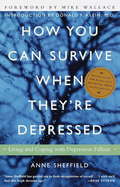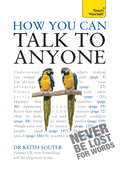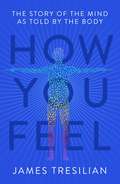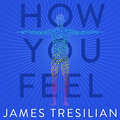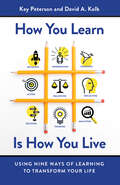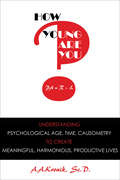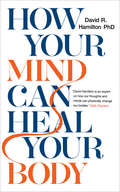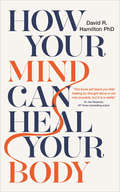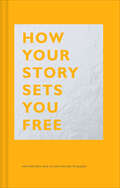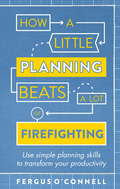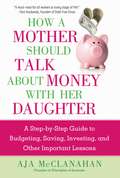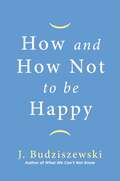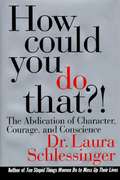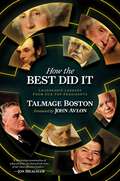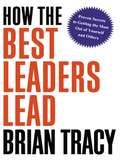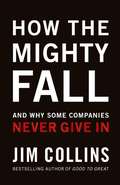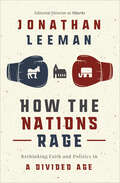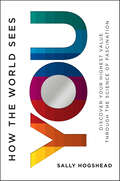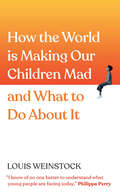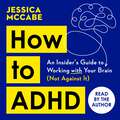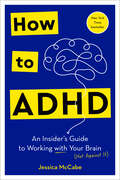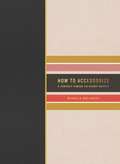- Table View
- List View
How You Can Survive When They're Depressed
by Mike Wallace Anne SheffieldEach year more than 17 million Americans suffer from a depressive illness, yet few suffer in solitude. How You Can Survive When They're Depressed explores depression from the perspective of those who are closest to the sufferers of this prevalent disorder--spouses, parents, children, and lovers--and gives the successful coping strategies of many people who live with a clinical depressive or manic-depressive and often suffer in silence, believing their own problems have no claim to attention.Depression fallout is the emotional toll on the depressive's family and close friends who are unaware of their own stressful reactions and needs. Sheffield outlines the five stages of depression fallout: confusion, self-doubt, demoralization, anger, and finally, the desire to escape. Many people will find relief in the knowledge that their self-blame, guilt, sadness, and resentment are a natural result of living with a depressed person. Sheffield brings together many real-life examples from the pioneering support group she attends at Beth Israel Medical Center of how people with depression fallout have learned to cope. From setting boundaries to maintaining an outside social life, she gives practical tactics for handling the challenges and emotional stresses on a day-to-day basis.
How You Can Survive When They're Depressed
by Mike Wallace Anne SheffieldEach year more than 17 million Americans suffer from a depressive illness, yet few suffer in solitude. How You Can Survive When They're Depressed explores depression from the perspective of those who are closest to the sufferers of this prevalent disorder--spouses, parents, children, and lovers--and gives the successful coping strategies of many people who live with a clinical depressive or manic-depressive and often suffer in silence, believing their own problems have no claim to attention.Depression fallout is the emotional toll on the depressive's family and close friends who are unaware of their own stressful reactions and needs. Sheffield outlines the five stages of depression fallout: confusion, self-doubt, demoralization, anger, and finally, the desire to escape. Many people will find relief in the knowledge that their self-blame, guilt, sadness, and resentment are a natural result of living with a depressed person. Sheffield brings together many real-life examples from the pioneering support group she attends at Beth Israel Medical Center of how people with depression fallout have learned to cope. From setting boundaries to maintaining an outside social life, she gives practical tactics for handling the challenges and emotional stresses on a day-to-day basis.
How You Can Talk To Anyone: Teach Yourself
by Keith Souter""How You Can Talk To Anyone"" will change the life of any reader who finds themselves scared and shy in social situations - and it will have a pretty amazing effect on those who just need a bit of a confidence boost!
How You Feel: The Story of the Mind as Told by the Body
by James TresilianClose your eyes and ask yourself, 'what do I feel?'You might feel thirsty or tired. You might feel healthy and well or perhaps a little under the weather. Maybe you can feel that you are standing or that you are leaning over. You may also feel the world around you - the shape and texture of an apple in your hand, the feel of a chair you're sitting on.All these feelings have something in common, say psychologists and neuroscientists. They are all mental events, things that happen in the mind. But what if this is all wrong?What if it's not just the mind, but also the body itself that feels? And not merely physical sensations, but other feelings that seem to have nothing to do with bodies. Things like 'emotions' and 'intuitions' - joy or rage, anxiety or optimism, or the feeling of being hard done by or misunderstood?Drawing on the latest research and a range of classic and contemporary thought, How You Feel shows you that your brain and your body are two parts of a single system that creates your mind and mental life. You will discover that you don't have feelings, thoughts and emotions inside your body, you have them with your body. There can be no mind without the body.Psychology is no longer about the brain, or about 'mind and body', it is about the whole that is you.
How You Feel: The Story of the Mind as Told by the Body
by James TresilianClose your eyes and ask yourself, ''what do I feel?''You might feel thirsty or tired. You might feel healthy and well or perhaps a little under the weather. Maybe you can feel that you are standing or that you are leaning over. You may also feel the world around you - the shape and texture of an apple in your hand, the feel of a chair you''re sitting on.All these feelings have something in common, say psychologists and neuroscientists. They are all mental events, things that happen in the mind. But what if this is all wrong?What if it''s not just the mind, but also the body itself that feels? And not merely physical sensations, but other feelings that seem to have nothing to do with bodies. Things like ''emotions'' and ''intuitions'' - joy or rage, anxiety or optimism, or the feeling of being hard done by or misunderstood?Drawing on the latest research and a range of classic and contemporary thought, How You Feel shows you that your brain and your body are two parts of a single system that creates your mind and mental life. You will discover that you don''t have feelings, thoughts and emotions inside your body, you have them with your body. There can be no mind without the body.Psychology is no longer about the brain, or about ''mind and body'', it is about the whole that is you.
How You Feel: The Story of the Mind as Told by the Body
by James TresilianClose your eyes and ask yourself, 'what do I feel?'You might feel thirsty or tired. You might feel healthy and well or perhaps a little under the weather. Maybe you can feel that you are standing or that you are leaning over. You may also feel the world around you - the shape and texture of an apple in your hand, the feel of a chair you're sitting on.All these feelings have something in common, say psychologists and neuroscientists. They are all mental events, things that happen in the mind. But what if this is all wrong?What if it's not just the mind, but also the body itself that feels? And not merely physical sensations, but other feelings that seem to have nothing to do with bodies. Things like 'emotions' and 'intuitions' - joy or rage, anxiety or optimism, or the feeling of being hard done by or misunderstood?Drawing on the latest research and a range of classic and contemporary thought, How You Feel shows you that your brain and your body are two parts of a single system that creates your mind and mental life. You will discover that you don't have feelings, thoughts and emotions inside your body, you have them with your body. There can be no mind without the body.Psychology is no longer about the brain, or about 'mind and body', it is about the whole that is you.
How You Learn Is How You Live: Using Nine Ways of Learning to Transform Your Life
by David A. Kolb Kay PetersonWhat's Your Learning Style?Being a lifelong learner is one of the secrets to happiness, success, and personal fulfillment. But what's the best way to become one? Kay Peterson and David Kolb have the answer. They offer deep, research-based insights into the ideal process of learning and guide you in identifying your dominant style. You'll discover how knowing your learning style can help you with all kinds of everyday challenges, from remembering someone's name to adding a crucial professional skill to your repertoire. This book is a guide to awakening the power of learning that lies within each of us.
How Young Are You?: Understanding Psychological Age, Time, Causometry, to Create Meaningful, Harmonious, Productive Lives
by A. A Kronik“His work is truly revolutionary. He has taken the most important of existential experiences and made them transparent for self-growth and research.” —Linda Berg-Cross, PhD, ABPP, Professor of Psychology, Howard UniversityThe main purpose of this research-based, self-help book is to introduce the goal-and-causal theory of “Psychological Time,” and to help you calculate your “Psychological Age”—that is, how old you feel, based on significant events in your life. You can also learn how to lower your psychological age (feel younger), using past experiences to move into the future, rejuvenating the mind for more satisfying personal growth, productivity, and happiness. We humans created the convention of Time—hours, days, millennia. But we also created “Psychological Time,” which we can compress (to survive an interminable wait, for example), or expand (to luxuriate in pleasure). So fully-integrated into our brain is this “Psychological Time” that, as part of the illusion, we can lose touch with “real” chronological time altogether, and even change the sequence of past events to contradict or override our otherwise communal understanding of the world. In this book, you will generate “Causograms,” a kind of map that graphically represents your perception of the cause-and-effect and goal-based connections that your mind naturally makes between life experiences. These include, but are not limited to achievements, memories triggered by new experiences, and expectations based on prior accomplishments. This process allows you to re-examine the relation between life events, goals and personal interactions, then compare your resulting “Psychological Age” to your chronological age. “What a wonderful approach to the human life cycle. I am enjoying it immensely.” —H. Keith H. Brodie, MD, James B. Duke Professor of Psychiatry, President Emeritus, Duke University
How Your Mind Can Heal Your Body: 10th Anniversary Edition
by David R. HamiltonThe connection between your mind and body is close, powerful, and often a valuable tool in taking control of your life and ambitions. The power of thought can affect you in profound ways, particularly in regards to its truly incredible effect on your health, explored in detail within these pages. This fascinating book by cutting-edge scientist David R. Hamilton explores the power of visualization, belief, and positive thinking —and their effects on the body. He also presents a revolutionary quantum-field healing meditation —through which you can change yourself on an atomic level —and shows you how you can use your imagination and thought processes to combat disease, pain, and illness. You will see how science and belief systems can merge . . . so that you can heal yourself more effectively than ever before!
How Your Mind Can Heal Your Body: 10th-Anniversary Edition
by David R. Hamilton&‘This book will teach you that healing by thought alone is not only possible, but it is a reality.&’ - Dr Joe Dispenza, New York Times bestselling author of Becoming SupernaturalThere is no longer any doubt that the way we think affects our bodies: countless scientific studies have shown this to be true. For former pharmaceutical scientist Dr David Hamilton, the testing of new drugs highlighted how profoundly the mind and body are connected. Time and time again, the control group of patients in drug trials improved at similar rates to those who actually received the medicines. Astounded, Dr Hamilton decided to change the direction of his work to explore the relationship between the mind and the body.This bestselling acclaimed book was first published 10 years ago. In it, Dr Hamilton explores the effect of visualization, belief and positive thinking on the body, and shows how using our imagination and mental processes can stimulate our own defences and healing systems to combat disease, pain and illness.In this new edition, Dr Hamilton has added four new chapters to discuss the latest cutting-edge information and extraordinary new techniques. These include using imagery to stimulate the immune system - a method that can benefit cancer patients undergoing conventional treatment - effectively using the mind to speed up rehabilitation from stroke, and powerful visualization strategies to help facilitate recovery from injury and illness.
How Your Story Sets You Free
by Heather Box Julian Mocine-McQueen&“Human beings understand the world best through stories. . . . And in this book Heather and Julian are ace story-enablers. A must-read!&” —Bill McKibben, New York Times–bestselling author of Falter and Radio Free Vermont Everyone has a story to tell. Sharing that story can change you, your community, or even the world. But how do you start? Discover the tools to unlock your truth and share it with the world: Storytelling coaches Heather Box and Julian Mocine-McQueen reveal how to embrace the power of personal storytelling in a series of easy steps. You'll learn how to share your experiences and invaluable knowledge with the people who need it most, whether it be in a blog post, a motivational speech, or just a conversation with a loved one. How Your Story Sets You Free is the path to finding the spark that ignites the fire and reminds you just how much your story matters. • Features over 100 pages of practical and motivating advice, with quotes from renowned storytellers including Maya Angelou and Marshall Ganz. • Includes specific step-by-step instructions to help you find the words to tell your story in the most powerful and impactful way. &“Working with Heather and Julian changed everything by getting me over the hurdle that stood between what was true about my life and what I was willing to share with the world. I&’m so grateful they&’ve distilled their wisdom and vision into this book.&” —Caledonia Curry, artist who goes by Swoon &“Heather and Julian are masterful in navigating you through the funny, rocky, delicate, and sometimes scary terrain of sharing yourself boldly, humbly, and unapologetically.&” —Rha Goddess, founder CEO of Move The Crowd, author of The Calling
How a Little Planning Beats a Lot of Firefighting: Use simple planning skills to transform your productivity
by Fergus O'ConnellIf you?ve ever been told that you `have to do more with less? or `work smarter not harder? and wondered what these things are supposed to mean, this book gives you the answer. It shows how a little planning - normally thought of as being the preserve of large undertakings, great construction projects or huge sporting events or military offensives ? will indeed enable you to get more done with less effort.
How a Little Planning Beats a Lot of Firefighting: Use simple planning skills to transform your productivity
by Fergus O’ConnellIf you’ve ever been told that you ‘have to do more with less’ or ‘work smarter not harder’ and wondered what these things are supposed to mean, this book gives you the answer. It shows how a little planning - normally thought of as being the preserve of large undertakings, great construction projects or huge sporting events or military offensives – will indeed enable you to get more done with less effort.
How a Mother Should Talk About Money with Her Daughter: A Step-by-Step Guide to Budgeting, Saving, Investing, and Other Important Lessons
by Aja McClanahanA Guide to Talking Finances with Our Daughters! As many as 56% of women feel that they&’d rather not talk about money with their loved ones. Some women say they were raised not to discuss money and others feel like the information is just too personal. Yet with many women controlling household budgets and raising the next generation of female earners, this could be a recipe for disaster in some homes and for society at large.How a Mother Should Talk About Money with Her Daughter helps readers broach money topics with their daughters in a meaningful, compassionate, and even fun way. It speaks to parents who may feel inadequate about their own money skills but still want to discuss money with their daughters while helping them build good financial habits. The goal is to start conversations that leave parents and girls empowered to love themselves (through good money management) and make the world a better place with their financial resources. Topics include how to save as a young person, the pros and cons of investing, how to determine which college is right (in terms of finances and future job prospects), how to determine a future partner is right (in terms of similar financial goals), and more.
How and How Not to Be Happy
by J. BudziszewskiIt&’s Time to Start Asking the Right Questions About Happiness The West is facing a happiness crisis. Today, less than a quarter of American adults rate themselves as very happy—a record low. False views of happiness abound, and the explosion in &“happiness studies&” has done little to dispel them. Why is true happiness so elusive, and why is it so hard to define? In How and How Not to Be Happy, internationally renowned philosopher and happiness theorist, J. Budziszewski, draws on decades of study to dispel the myths and wishful thinking that blind people from uncovering lasting fulfillment. Could happiness lie in health, wealth, responsibility, or pleasure? Should we settle for imperfect happiness? What would it even mean to attain perfect fulfillment? Budziszewski separates the wheat from the chaff, exploring how to attain happiness—and just as importantly, how not to.
How could you do that?!: The Abdication of Character, Courage, and Conscience
by Laura SchlessingerDr. Laura Schlessinger--the internationally syndicated radio superhost shows both men and women how honoring our personal values--or doing good--leads to feeling great.
How the Best Did It: Leadership Lessons from Our Top Presidents
by Talmage BostonHow the Best Did It is an accessible and insightful explanation of how the most important leadership traits from America&’s eight greatest presidents can be implemented by today&’s leaders. &“A discerning examination of what all of us can learn from some of our most effective leaders who have held—and wielded—ultimate power at the highest level.&” —Jon MeachamDavid O. Stewart (author of George Washington: The Political Rise of America&’s Founding Father) on the George Washington chapter: &“In How the Best Did It, Talmage Boston demonstrates rare gifts in sifting gold nuggets from the endless gravel beds of known facts about eight leading presidents, then delivering them concisely and persuasively. In his insightful study of George Washington, he finds the core of America&’s first great leader without exaggerating his talents, and makes him someone from whom we can learn and cherish.&” Annette Gordon-Reed (Pulitzer-winning historian and coauthor of Most Blessed of the Patriarchs: Thomas Jefferson and the Empire of the Imagination) on the Thomas Jefferson chapter: &“Thomas Jefferson was one the most effective American leaders of his time, creating a political party that dominated American politics for more than a quarter of a century. With great insight and clear writing, Talmage Boston brings Jefferson to life as the talented leader who shaped the course of early American society.&” Ronald C. White Jr. (author of A. Lincoln and three other notable books on Lincoln) on the Abraham Lincoln chapter: &“Talmage Boston offers a wise and wide-ranging understanding of Lincoln&’s leadership qualities. What makes Boston&’s chapter distinct is the personal questions that challenge the reader to apply Lincoln&’s values to their lives today.&”
How the Best Leaders Lead: Proven Secrets to Getting the Most Out of Yourself and Others
by Brian TracyThe world&’s greatest business leaders make it all look easy because they keep it simple: measurable, repeatable methods that generate exceptional results in both strong markets and weak, good economies and bad.Leadership expert Brian Tracy has guided countless thousands of professionals, executives, and leaders of all stripes to truly startling results through his business books, seminars and consulting work.In How the Best Leaders Lead, Tracy breaks down the art and science of business leadership into the seven fundamental responsibilities that outstanding leaders master. Essential for success in any organization and every leadership position, they are:Setting and achieving goalsFostering innovationProblem solving and decision makingSetting prioritiesSetting high standards and leading by exampleInspiring and motivating othersPerforming and achieving resultsThis book will take you through a thorough self-analysis with which you will discover what is truly important to you—and identify the specific steps you must take to achieve it. You&’ll then listen Tracy&’s life-changing lessons culled from the leading edges of business, the annals of history and military strategy, and the wisdom of the world&’s most powerful leadership and management thinkers past and present.Leadership is an exact science but a simple one, born of clear vision and courage, self -knowledge and integrity, focus and confidence. With acute insight and Tracy&’s accessible guidance, How the Best Leaders Lead brings those powerful attributes and leadership greatness easily within your reach.
How the Mighty Fall: And Why Some Companies Never Give In
by Jim CollinsDecline can be avoided. Decline can be detected. Decline can be reversed. Amidst the desolate landscape of fallen great companies, Jim Collins began to wonder: How do the mighty fall? Can decline be detected early and avoided? How far can a company fall before the path toward doom becomes inevitable and unshakable? How can companies reverse course? In How the Mighty Fall, Collins confronts these questions, offering leaders the well-founded hope that they can learn how to stave off decline and, if they find themselves falling, reverse their course. Collins' research project-more than four years in duration-uncovered five step-wise stages of decline: Stage 1: Hubris Born of Success, Stage 2: Undisciplined Pursuit of More, Stage 3: Denial of Risk and Peril, Stage 4: Grasping for Salvation, Stage 5: Capitulation to Irrelevance or Death. By understanding these stages of decline, leaders can substantially reduce their chances of falling all the way to the bottom. Great companies can stumble, badly, and recover. Every institution, no matter how great, is vulnerable to decline. There is no law of nature that the most powerful will inevitably remain at the top. Anyone can fall and most eventually do. But, as Collins' research emphasizes, some companies do indeed recover--in some cases, coming back even stronger-even after having crashed into the depths of Stage 4. Decline, it turns out, is largely self-inflicted, and the path to recovery lies largely within our own hands. We are not imprisoned by our circumstances, our history, or even our staggering defeats along the way. As long as we never get entirely knocked out of the game, hope always remains. The mighty can fall, but they can often rise again.
How the Nations Rage: Rethinking Faith and Politics in a Divided Age
by Jonathan LeemanHow can the church move forward in unity amid such political strife and cultural contention?As Christians, we&’ve felt pushed to the outskirts of national public life, yet even within our congregations we are divided about how to respond. Some want to strengthen the evangelical voting bloc. Others focus on social justice causes, and still others would abandon the public square altogether. What do we do when brothers and sisters in Christ sit next to each other in the pews but feel divided and angry? Is there a way forward?In How the Nations Rage, political theology scholar and pastor Jonathan Leeman challenges Christians from across the spectrum to hit the restart button byshifting our focus from redeeming the nation to living as a nation already redeemedrejecting the false allure of building heaven on earth while living faithfully as citizens of a heavenly kingdomletting Jesus&’ teaching shape our public engagement as we love our neighbors and seek justiceWhen we identify with Christ more than a political party or social grouping, we can return to the church&’s unchanging political task: to become the salt and light Jesus calls us to be and offer the hope of his kingdom to the nations.
How the World Sees You: Discover Your Highest Value Through the Science of Fascination
by Sally HogsheadThis &“lively&” New York Times–bestselling book &“is worth the time of anyone trying to set him or herself apart in an ever-more competitive job market&” (Publishers Weekly). You already know how you see the world. But do you know how the world sees you? How is your personality most likely to impress and influence the person sitting on the other side of the desk or boardroom? Once you know what makes you valuable to others, you're more authentic and confident, and more able to make a positive impression. It all begins with understanding how the world sees you—at your best. How the World Sees You gives you the step-by-step method to describe yourself in just two or three words. This short phrase is your Anthem, the tagline for your personality. Your Anthem guides you like a mission statement, helping you to build your team, write a LinkedIn profile, or captivate an audience. This book includes a private code to unlock one free Fascination Advantage® Personality Test. Your customized online report, based on Sally Hogshead's extensive research on what fascinates listeners, will reveal how you fascinate others, including Your top two Fascination Advantages in communication The personality Archetypes you need on your team to optimize your success The five words to describe your personality's highest value To become more successful, you do not have to change who you are—you have to become more of who you are. How the World Sees You reveals who you are at your best so you can create better relationships, grow your business, and become intensely valuable to those who matter most.
How the World is Making Our Children Mad and What to Do About It: A Field Guide to Raising Empowered Children and Growing a More Beautiful World
by Louis WeinstockA critical parenting book for helping children through turbulent times that combines case studies and simple exercises, whether your child is struggling with mental health issues already or you want to help them build their capacity to handle change and uncertainty.How can we raise children in a world that appears to have gone so wrong? We all want our children to grow up in a world where they feel safe, and where people are kind to each other and the planet. But when we hear about climate change, a mental health crisis, and war, it's hard not to worry about the future and how they will cope.Drawing on over 20 years of helping children and families, psychotherapist Louis Weinstock is here to help. Combining case studies, playful meditations, and simple exercises with life-changing insights from history, science, psychology, and anthropology, this is a parenting book like no other. Whether your child is struggling with mental health issues already, or you want to build their capacity to handle change and uncertainty, this book is a safe place to catch your breath and develop the skills to help your child through life's challenges. You will discover ways to find peace in the middle of chaos, bring deeper levels of love and healing to the troubled parts of your child (and yourself), and find hope when things feel hopeless.Most importantly, you will see that inside of you there is strength, wisdom, and beauty, and no matter what is going on in this mad world, you can guide your child toward a more beautiful tomorrow.
How to ADHD
by Jessica McCabe**From the host and creator of the award-winning HOW TO ADHD Youtube channel**In How to ADHD, Jessica McCabe reveals the insights and tools that have changed her life, while offering an unflinching look at the realities of every day with ADHD. Sharing stories of her struggles with the condition, which spiralled as she approached adulthood, Jessica offers expert-backed guidance for adapting your environment, routines and systems to work with the ADHD brain, including how to:- boost your organisational skills and learn why doing more starts with doing less- facilitate your focus and fight distractions by decreasing the noise- build your time wisdom by planning backwards to prioritise more effectivelyPresented in an ADHD-friendly design and packed with practical advice and tools, How to ADHD is an affirming, warm and helpful guide that will help you recognise your challenges, tackle 'bad brain days', and to ultimately be kinder to yourself.
How to ADHD: An Insider's Guide to Working with Your Brain (Not Against It)
by Jessica McCabeIn this honest, friendly, and shame-free guide, the creator of the award-winning YouTube channel How to ADHD shares the hard-won insights and practical strategies that have helped her survive, even thrive, in a world not built for her brain.&“The world of ADHD has been waiting for this book with bated breath for many years. If there&’s a fairy godmother of our lot, it&’s Jessica McCabe.&”—Edward Hallowell, MD, coauthor of Driven to Distraction and ADHD 2.0Forget &“try harder.&” When your brain works differently, you need to try different. Diagnosed with ADHD at age twelve, Jessica struggled with a brain that she didn&’t understand. She lost things constantly, couldn&’t finish projects, and felt like she was putting more effort in than everyone around her while falling further and further behind. At thirty-two years old—broke, divorced, and living with her mom—Jessica decided to look more deeply into her ADHD challenges. She reached out to experts, devoured articles, and shared her discoveries on YouTube. In How to ADHD, Jessica reveals the tools that have changed her life while offering an unflinching look at the realities of living with ADHD. The key to navigating a world not built for the neurodivergent brain, she discovered, isn&’t to fix or fight against its natural tendencies but to understand and work with them. She explains how ADHD affects everyday life, covering executive function impairments, rejection sensitivity, difficulties with attention regulation, and more. You&’ll also find ADHD-specific strategies for adapting your environment, routines, and systems, including: • Boost the signal and decrease the noise. Facilitate focus by putting your goals where you can see them and fighting distractions with distractions.• Have less stuff to manage. Learn why you have trouble planning and prioritizing, and why doing more starts with doing less.• Build your &“time wisdom.&” Work backward when you plan, and track how long it actually takes you to do something.• Learn about your emotions. Understand how naming your emotions and letting yourself experience them can make them easier to regulate. With quotes from Jessica&’s online community, chapter summaries, and reading shortcuts designed for the neurodivergent reader, How to ADHD will help you recognize your strengths and challenges, tackle &“bad brain days,&” and be kinder to yourself in the process.
How to Accessorize: A Perfect Finish to Every Outfit (How To Ser.)
by Micaela ErlangerMicaela Erlanger has dressed and accessorized many celebrities for the red carpet, now she's sharing her hottest fashion tips for finishing any outfit with you. It's chock-full of tips on what you really want to know: Do your bag and shoes need to match? Can you mix metals? What’s the most flattering way to tie a scarf? Whether you’re dressing for your birthday party, date night, a job interview, or just a trip to the supermarket, this book will help you look—and feel—confident and chic. You don’t need a red carpet budget to benefit from her advice. You’ll learn: · The Sunnies Algorithm: Identify your face shape and the perfect sunglasses for you. · A Flick of the Wrist: Learn to layer cuffs, bangles, chain bracelets, and charms. · Your Accessory Recipe: Avoid overaccessorizing in a few simple steps. · Steady Incline: How to choose a heel you can walk in. · Make It Up: Select a statement lip or a smoky eye. · The Rules of Seasonality: Know which fabrics work for which seasons, and which ones work all year round.
